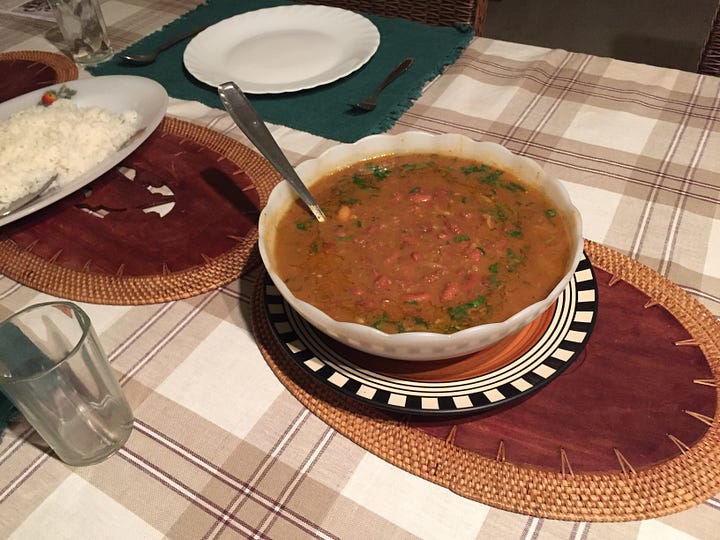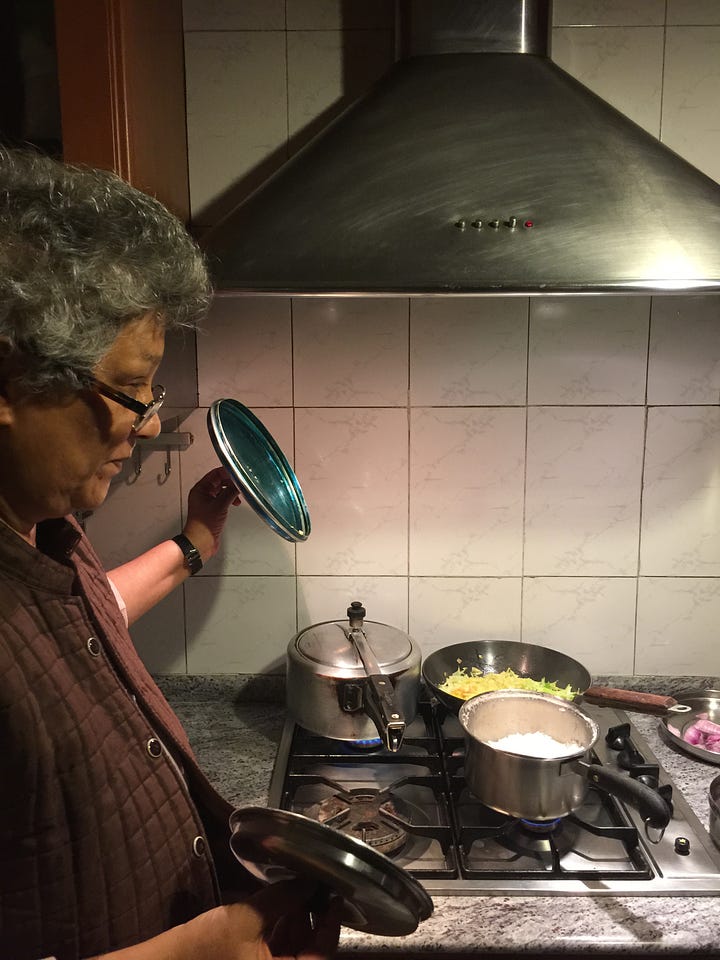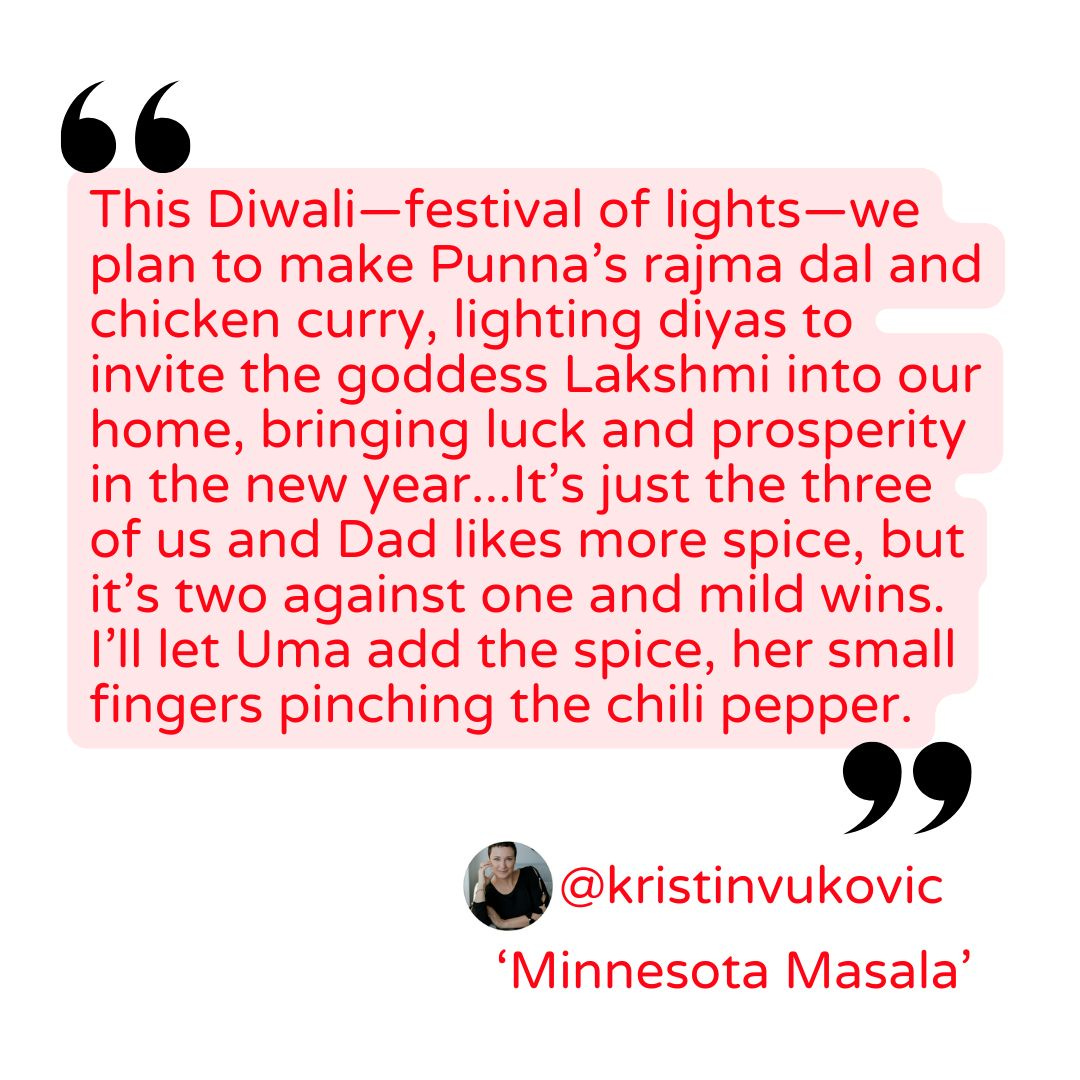Minnesota Masala
Community Voices X Pen Parentis - a story + recipe for you on Diwali, the festival of lights, by Kristin Vuković
Happy Diwali, One Potato Community! Today we’re bringing you an essay from our Community Voices - authentic stories relating to families and food, especially highlighting and sharing the diversity in our world - how we can all come together over those shared values, memories, and experiences. Kristin Vuković writes about learning to savor spiciness, cooking Indian food with her mother-in-law, and passing down those flavors to her daughter.
This is a bonus essay + recipe, shared especially for Diwali, the festival of lights. Paid Subscribers can always read the complete essays for $45/year and have access to our whole archives + recipes. New Specials include our Sunday Community Voices essays and Order Up! Chef and Influencer interviews, which are published regularly every Sunday.
Pen Parentis, a national nonprofit that helps writers stay on creative track after having kids, is proud to sponsor Community Voices X Pen Parentis. We believe that creative careers are as valuable as corporate careers, and that they should be given the same respect. Do you have kids and a writing career? Check out our annual Writing Fellowship for New Parents, our free monthly Literary Salons, and a Cycle of Support that includes membership, mentorship and accountability meetups. More info about the help we offer writers who are also parents at writerparentannex.com
You don’t have to be a member of Pen Parentis to share your story. We would love to have you contribute your family stories as well and foster building this community - please send us a DM or email hello @ onepotato.com if you’re interested in sharing 🥔
Minnesota Masala
By Kristin Vuković
“How much?” my mother-in-law, Punna, asked, arching her eyebrow. She held up a jar of red chili pepper, narrowing the gap between her fingers to a pinch. “More,” I said, “I can handle the spice.” Growing up in a suburb of St. Paul, Minnesota, I never imagined I’d be standing in a kitchen in India discussing how much chili pepper to put into the tadka, a base for dal made of onions, tomatoes and spices. Most Minnesotans prefer mild food, owing to the strong Scandinavian heritage; Minnesota is home to the largest population of Norwegian and Swedish descendants outside of Scandinavia. And with our family’s Croatian and Slovenian roots, I didn’t grow up eating spicy dishes.
There are many types of dal, made of lentils or beans: mung dal, lobia dal, urad dal, masoor dal, rajma dal, toor dal, chana dal, and others that are only made in particular states of the Indian subcontinent. To my recollection, I’d never even eaten Indian food until I moved to New York City, where my culinary palate expanded to encompass the cuisines of places I’d never visited, countries halfway across the world.
When I married an Indian man, a Punjabi who grew up in the tea gardens of northeast India, I had already embarked on my own spice road. I loved green curry from the Thai take-out place near my Upper West Side apartment, and regularly frequented the local Indian joint for dal makhani, a rich lentil curry. Jaidev, my husband, told me that my favorite Indian dish originates from the Punjab region on the borders of what are now India and Pakistan—the precise area where his family hails from. “It’s spicier in India,” he told me.
Years later, after multiple trips to India, I found myself in Punna’s kitchen in a high-rise flat in Bangalore, in the temperate southern state of Karnataka where she retired, learning how to cook dal. Not the kind of dal you find at Indian restaurants, which typically serve heavy dal makhani with huge dollops of butter. We cooked rajma dal, a north Indian dish made with kidney beans. The homemade version is healthy and uses only a little bit of oil, and far less heat. “Home food is light, not like in restaurants,” Punna said. “You can eat and eat and not gain kilos.”


—> Behind the Paywall: Read the rest of Kristin’s story and Punna’s Rajma Dal recipe…
Keep reading with a 7-day free trial
Subscribe to One Potato to keep reading this post and get 7 days of free access to the full post archives.





